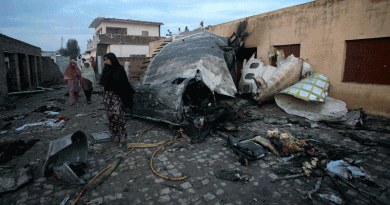ANALYSIS: How Social Isolationism VS Political Globalism will rip the Muslim Brotherhood apart
Because of that globalism, Islamists fail to provide an acceptable political platform that reconciles nation-state with the core principles of their own ideology.
In his book titled ‘The Crisis Of The Islamic Movement In Egypt: A New Reading Of Ideas And Transformations’, released in 2016, Kamal Habib, a veteran analyst on the Islamist movements, sheds light on the crisis in which the Islamist movement is mired, particularly after the Muslim Brotherhood, the largest Islamist organization ascended to power—through alliance with other Islamist groups—and then removed from it.
In his book, the author argues that the Islamist movement in Egypt should revert to the original platform on which they had been established. He contended that the Islamist movement should revert back to its role as a movement for the entire nation, not a movement serving the agenda of a certain group or organization.
The book appears to touch on the intellectual and ideological flaws plaguing the Islamist movement, rendering all their schemes doomed to failure. Their ideology—centered on the establishment of the puritanical Islamic utopia—is no longer cohesive or consistent.
The young Islamists are no longer locked in the books authored by Islamist ideologues—such as Sayyed Qutb—nor are they convinced—given the consecutive setbacks that their movements suffered—of the possibility that such a utopian state could be established soon. They have become disillusioned.
This argument raises important question as to how the Islamic movement in Egypt—or elsewhere in the region—views itself. Many Islamists believe that they are messiahs. They have a grand objective for which they should strive—pursuing bellicosity rather than pacifism. But, according to the author, this hadn’t been the case and should never be.
On the ground, Islamists have failed in more than one theater over the last decade. Some of them voluntarily relinquished power, while others were forced to cede power, shifting to underground activism—their normal. Failure was also on the horizon for the more radical Jihadi groups.
The Islamic State has been defeated in Iraq and Syria, the caliphate has been toppled, and the organization’s leader, Abu Bakr Al-Baghdadi, has been killed. Al-Qaeda remains intact though its leader Ayman Al-Zawahiri was taken out in a US drone strike on his hideout in Afghanistan capital Kabul. The only exception to all these failures is the Taliban of Afghanistan which has been ruling the country for over a year now after the US withdrawal after two decades.
Not only had the previous decade, but also the previous century, been devoid of any viable Islamist model of governance anywhere in the world. There had not been a single successful governance experience since the Muslim Brotherhood was founded in the 1920s. Islamists have continued to swirl in a vortex of covert activism.
Back to the book, Habib insists that the Islamist movements are pitting themselves against their own people, turning themselves into divisive elements. They draw on centuries-old cleavages that started in the early days of Islam when Kharijites—who rebelled against Ali ibn Abu Talib—had emerged.
The overall Islamist landscape suggests an ignominious failure. There’s no Islamic state—and even there’s nothing called the Islamic State, which was toppled upon global intervention that put an end to the atrocities it had committed in the name of Islam. Unsurprisingly, the Islamist organizations, whose core mission centers on working to establish this ‘Islamic’ caliphate are no longer intact. They remain incapable of addressing the ideological flaws that produced secessions in their ranks.
Jordan’s Muslim Brotherhood branch formally severed organizational ties with the region-wide movement based in Egypt in February 2016. The decision was the latest setback for the wider Brotherhood, which was once seen as the main political beneficiary of the 2011 Arab Spring uprisings but has been hard hit in recent years following uprisings that ended their brief, clumsy rule. A year before the formal splinter, the Jordanian branch had split several times, with breakaway groups emphasizing a localist rather than globalist agenda.
Because of that globalism, Islamists fail to provide an acceptable political platform that reconciles nation-state with the core principles of their own ideology. Hence, they antagonize the nation-state while failing to provide a viable and consistent ideological, intellectual and political platform through which they can operate.
According to other observers, Islamist movements have turned themselves into ghettos at the social levels. They cultivate their ideology and political activism in communities isolated from the mainstream Muslims. In Egypt, instance, marriage is only permitted between members of the same organization. No marriage is allowed between males from outside the group and females from within the group—and vice versa.
This unwritten tradition is likely pursued to preserve—in addition to the organizational cohesion—the ideological ‘blue collar’ of the group’s members and prevent it from being contaminated by the mainstream understanding of Islam prevalent throughout societies where they live. This is the reason we have two versions of Islam: the mainstream Islam and the political Islam.
And here’s a stark paradox, when the Brotherhood address the masses from outside the group, they speak of the globalist Islam and mastership of the world. They want their ideology to enter every single home. But when it comes to their own organization, they don’t allow in those who don’t have the ‘ideological blue collar’ of the Brotherhood’.
Yet, Islamists don’t have free discussions—even on core issues related to the ideology of their own movements. They have been using the old mechanisms their peers used in the 1950s and 1960s where there was no internet or means of communication. They had cultivated their ideologies in closed-off organizations which cannot remain-closed-off today. Today is a far cry from yesterday. And the young recruits among the Islamists have a wider spectrum of opinions than the older generations. This makes it difficult for Islamist organizations to convince their young cadres of the plausibility of their ideology.
In other words, if it weren’t for the harsh repression inflicted on members of these organizations by the state and playing the victim card, the Islamist organizations would remain devoid of cadres—excepting a few cohorts of zealots. Most Islamists nowadays derive their legitimacy from the notion that they are victims of repressive states—not the ones embracing a plausible ideology that others should follow.
One of the central tenets of Islamist thought, for example, is the necessity of establishing the caliphate. This pillar is easily debunked—but only if we look back in time. There were many periods in Islamic history when the caliphate was only a nominal authority. There was no clear mechanism in place to establish and run this caliphate. The process was random, largely determined by the political conditions under which these empires had evolved.
The flawed distorted Islamist ideology needs to be broken down, with the correct version being disseminated on the same scale as the distorted one. There needs to be a counter-narrative. This entails discussions with the Islamist grassroots who have become disenchanted with the longstanding narrative pushing moral superiority and victimization. There should be another narrative pushing the ideological flaws and the wrong underpinnings on which the entire Islamist ideology is established.
On the other hand—in order to have a viable and sustainable political project—Islamists must address—and urgently reform—their ideological flaws. They should reconcile with the societies in which they live and end the ‘ghetto’ status they have held for decades. Moreover, they must adapt their ideology to fit the nation-state, abandon the tired notion of the utopian Islamic state, which has been hardly sporadically established throughout Islamic history. To establish an acceptable political life, Islamists should be less radicalized, less globalist, and more open to their local communities and governments.
Mostapha Hassan Abdelwahab is the former editorial manager of the English edition of the Baghdad Post. He is focusing on Iraq, Iran and political Islam movements, with articles posted on the Herald Report, Vocal Europe, the Greater Middle East and other platforms.



